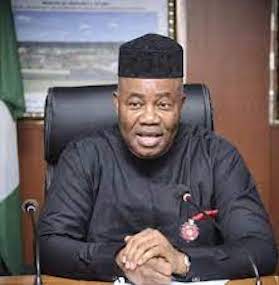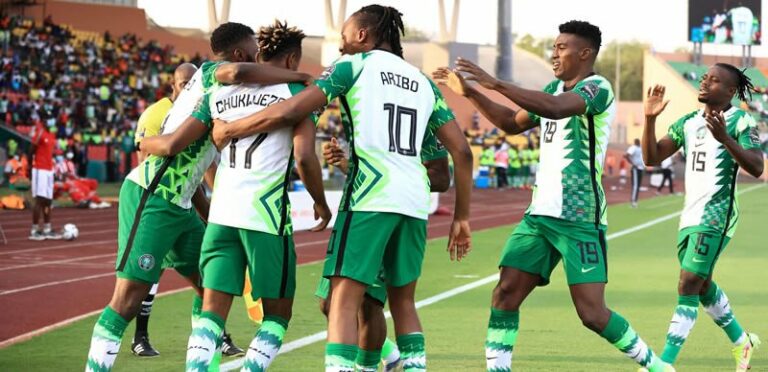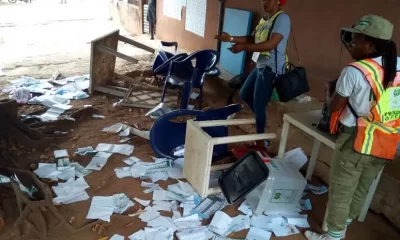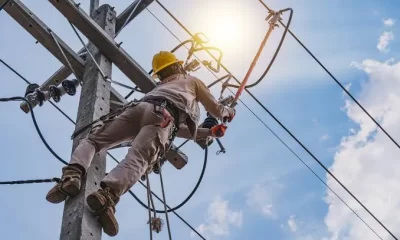NEWS
2024 Appropriation Bill Passes Second Reading, Senators Call for Reduction in Borrowing

By Eze Okechukwu, Abuja
The Senate has passed for second reading, the N27.5trillion 2024 Appropriation Bill presented by President Bola Ahmed Tinubu on Nov 29, for the approval of National Assembly.
The scaling of the bill for second reading at plenary on Friday followed debates by lawmakers on the general principles of the bill.
The lawmakers, at the resumed debate called for increased funding for road infrastructure, education, power, agriculture, among other sectors in the country.
They also called for a reduction in borrowing and improved budgetary provision for security and sustenance of peace in the Niger Delta for improved crude oil production.
Recall that President Bola Tinubu on Wednesday presented a record N27.5 trillion as the proposed budget for 2024, before the joint session of the senate and house of representatives and asked the lawmakers to expedite the consideration of the budget and ensure that the appropriation bill was passed before January.
Senator Adams Oshiomole (APC -Edo) said there was need for appropriations to be made for the completion of the Benin-Auchi road, adding that the road was a major link connecting Nigerians from the six geo-political zone.
He said the eventual completion of the road would further help improve economic activities.
Speaking on the exchange rate volatility, the former Governor of Edo state pointed out that it was not for the Senate to be debating exchange rate, but that was a matter of micro economic policies.
Senator Francis Fadahunsi (PDP-Osun), who commended the 2024 budget estimates said there was need for the masses to benefit from the content of the budget on implementation.
He called for allocation of more funds to ensure completion of roads in Osun state and other parts of the federation.
Senator Enyinnaya Abaribe(APGA-Abia)said not much was allocated to Power as information indicated that less than 3 per cent was allocated to the power sector in the budget.
He said power was key to employment generation and optimal workings of other sectors and the economy in general.
Senator Abaribe however explained that the Senate would have to re-order the priorities in the budget for direct impact on the economy, going forward.
Other Senators, who emphasised the need to appropriate more funds for road infrastructure, and improve educational systems among other sectors included Senator Oluranti Adebule(APC-Lagos) and Senator Abba Moro(PDP-Benue).
Senator Moro said allocation to education should be based on UNESCO provisions, given the challenges in the education sector.
Former President of Senate, Senator Ahmad lawan commended President Tinubu for the budget.
He said the success of any administration was based on the support the legislature gives to the executive, noting that the National Assembly must continue to give support to the President Tinubu.
He called on the senate committees to be interested on what happened on the implementation of previous budgets of 2021, 2022, 2023 both supplementary and main budget.
Senator Lawan said emphasis must be placed on having a secured safe school for schools to function, and provision of enabling peace in Niger-Delta.
He called for prioritisation of security in 2024 budget, saying that security was key in attaining the required economic activities.
Last week, both the senate and the house of representatives approved the 2024-2026 medium-term expenditure framework (MTEF) and fiscal strategy paper (FSP), the parameters on which the 2024 appropriation bill will be framed.
The lawmakers approved $73.96, $73.76 and $69.90 per barrel as benchmark oil prices for daily crude oil production of 1.78 million barrels, 1.80 million barrels, and 1.81 million barrels, for 2024, 2025, and 2026 respectively.
Also, the parliament approved an exchange rate of N700/$, N665.61/$ and N669.79/$, as proposed by the federal government for the period 2024–2026.
Recall that President Tinubu, at his maiden budget presentation before the National Assembly said the proposed 2024 budget will ensure micro-economic stability, poverty reduction, and greater access to social security.
The president highlighted priority areas such as security, local job creation, macro-economic stability, investment environment optimization, human capital development, poverty reduction, and social security.
Deputy President of Senate, Senator Barau Jubril, who concluded the proceedings referred the bill to Committee of Appropriations.
The committee is to return back t6o plenary on December 19 for further legislative input on the bill.
NEWS
Fire Outbreak: Gov Makinde Visits Fresh FM, Pledges Enhanced Emergency Services

By Mike Odiakose, Abuja
Oyo State Governor, ‘Seyi Makinde, at the weekend visited the premises of Fresh FM, Ibadan, following a recent fire outbreak at the popular radio station.
The governor’s visit was to assess the extent of the damage, commiserate with the management and staff, and reaffirm his administration’s commitment to supporting affected businesses while strengthening emergency response systems across the state.
During the visit, Governor Makinde expressed sympathy to the station’s founder, Dr.
Yinka Ayefele, and the entire Fresh FM team, describing the incident as unfortunate but preventable.He noted that preliminary reports suggest the fire caused significant damage to equipment and parts of the building, disrupting the station’s operations.
However, he commended the swift response of the Oyo State Fire Service, which helped contain the blaze and prevent further loss.
“My heart goes out to Dr. Ayefele and the Fresh FM family. This station has been a vital voice in Oyo State, and we will not allow this setback to silence it,” Governor Makinde said.
“We are committed to supporting Fresh FM to get back on its feet, and I have directed relevant agencies to assess how we can provide immediate assistance.”
The governor also used the occasion to address the broader issue of emergency preparedness in Oyo State.
He pledged to bolster the state’s emergency services by equipping the Oyo State Fire Service with modern firefighting tools, enhancing training for personnel, and improving response times to emergencies.
Additionally, he announced plans to collaborate with private organizations to promote fire safety awareness and ensure compliance with safety standards in public and commercial buildings.
“This administration will invest in upgrading our fire service infrastructure and work with stakeholders to reduce the risks of such incidents in the future.”
Dr. Yinka Ayefele, speaking on behalf of Fresh FM, expressed gratitude for the governor’s visit and support, assuring listeners that the station would resume full operations soon.
“We are touched by His Excellency’s concern and commitment. With the support of our community and the state government, Fresh FM will come back stronger,” he said.
Governor Makinde concluded the visit by inspecting the damaged sections of the station and holding a closed-door meeting with the management to discuss immediate recovery plans.
The Oyo State Government has promised to release further details on the support package for Fresh FM and the proposed upgrades to emergency services in the coming days.
NEWS
Emir of Zuru Dies in London at 81
The Emir of Zuru in Kebbi, retired Maj.-Gen. Muhammadu Sani Sami, has passed away on Saturday night.This is contained in a statement by Alhaji Ahmed Idris, Chief Press Secretary to the Kebbi Governor, issued to newsmen in Birnin Kebbi on Sunday.Idris quoted the State Commissioner for Local Government and Chieftaincy Affairs, Alhaji Garba Umar-Dutsinmari as saying that the emir died at the age of 81 years in a London hospital after an illness.
According to him, the traditional ruler left behind four wives and seven children. “The Kebbi Government is using this medium to extend its heartfelt condolences to his immediate family members, Zuru Emirate Council, Zuru people and the entire people of Kebbi.“May the Almighty Allah forgive his shortcomings and grant him Jannatul Firdaus,” the commissioner said.Umar-Dutsinmari revealed that the burial arrangements would be communicated later.The late emir was an Army personnel who rose through the ranks up to the position of a Maj.-Gen.He joined the Nigerian Army on Dec. 10, 1962 and attended several courses, both within and outside Nigeria, one of which was the Mons Officer Cadet School in Aldershot, England and was commissioned on 25 July 1963.From 1984-1985, he served as the Military Administrator, Bauchi State, 1985-1987, Officer, Nigerians Army School of Infantry, 1985-1987, Commanding Officer of 82nd Division, appointed General Officer Commanding 1 Mechanised Division, 1988. Late Muhammadu Sani Sami was appointed Emir of Zuru in 1995, a position he held until his demise. (NAN)NEWS
Special Report: Super Eagles CHAN Debacle Exposes Deep Fault Lines

Nigeria’s Super Eagles (B team) endured a catastrophic campaign at the 2024 African Nations Championship (CHAN), leaving analysts and fans questioning the foundations of the nation’s football structure. The team’s misfortune was evident from the onset. Drawn into Group D with Senegal, Sudan and Congo, the side never looked ready for continental competition.
A narrow 0-1 defeat to host Senegal was followed by an embarrassing 4-0 drubbing by Sudan. With no points, the team’s hopes evaporated early. Even a win in their final match against Congo could not salvage their chances. Nigeria’s elimination was confirmed, sparking outrage among passionate supporters and football analysts. To many followers, the debacle was long in coming. The domestic league, which supplies players for CHAN, has been in steady decline for over a decade. Unlike the main Super Eagles, who feature foreign-based players, the CHAN squad is exclusively drawn from the Nigeria Premier Football League (NPFL). This exposes deep-rooted domestic failings. Monday Izegagbe, a Lagos-based football analyst, described the team’s campaign as calamitous, reflecting the weaknesses of the NPFL and the inertia within Nigerian football’s governing structures. He questioned how a country once regarded as Africa’s football powerhouse could slump to losing 4-0 against Sudan, a side historically considered less formidable. “This performance is deeply discouraging. It shows our league is stagnant and not producing competitive talent. The NFF must act urgently before things worsen,” Izegagbe declared. For Izegagbe, structural reform is unavoidable. He urged the Nigeria Football Federation (NFF) to encourage private sector investment, professionalise club management and establish youth academies across the federation. He argued that youth academies should serve as pipelines for talent, reducing dependence on ad-hoc player recruitment. This, he said, would strengthen the country’s football foundation. Equally important, he added, are strict coaching standards. Every NPFL club, he said, should have certified coaches, modern fitness regimes and tactical programmes aligned with global best practices. Izegagbe also highlighted the financial struggles within the NPFL. Low salaries and irregular payments push talented players abroad, leaving the league with weakened squads and limited competitiveness. “The league must be run like a business, prioritising transparency and accountability. Clubs should attract sponsorships, generate revenue and reinvest in talent and facilities,” he stressed. Former Nigerian international, Azuka Izu, echoed the call for reform. For him, the Super Eagles B’s failures stemmed from more than just poor tactics or unfit players. He argued that Nigeria’s football problems are systemic, spanning selection processes, coaching methods, player preparation, and inadequate facilities. These, he warned, have combined to damage the country’s reputation. “The team lacked cohesion, ideas and purpose. A re-examination of the selection process and tactical direction is urgently required,” Izu said. He criticised the habit of selecting players based on reputation rather than form. According to him, such practices discourage meritocracy and undermine genuine competition for places. “Selections must be based strictly on performance and readiness, not on names or politics. Otherwise, the national team will remain weak and disorganised,” he said. For Izu, the problem also lies in inadequate training camps. Players are often assembled hurriedly, given insufficient preparation time and subjected to outdated tactical instructions. He suggested more rigorous training programmes, incorporating modern sports science, tactical flexibility and exposure to international playing styles. These, he said, would improve player adaptability and effectiveness. Izu further emphasised the importance of infrastructure. Without proper pitches, modern training centres and well-maintained stadia, he argued, Nigerian football will continue to lag behind regional competitors. He proposed that the government and NFF explore public-private partnerships to upgrade facilities, thereby creating sustainable environments for player growth and club competitiveness. “This humiliation should be a wake-up call. Without a complete overhaul, we risk more embarrassment and a gradual erosion of Nigeria’s football heritage,” he warned. Both analysts agreed that the NPFL has become the weak link. While Nigerian players abroad continue to shine, the domestic league struggles for relevance and credibility. At the heart of the crisis is poor management. Clubs frequently lack financial discipline, players endure irregular salaries, and matches are plagued by poor officiating and organisational lapses. For fans, this reality is heartbreaking. Nigeria has produced global stars—Jay-Jay Okocha, Nwankwo Kanu, Rashidi Yekini—yet the structures that created them appear broken and outdated. The contrast between Nigeria’s football heritage and its current domestic struggles is stark. Once feared on the continent, the home-based Eagles are now reduced to easy prey. Observers argue that CHAN has exposed the rot. The tournament, designed to showcase local talent, has instead highlighted Nigeria’s inability to nurture competitive home-grown players. Public frustration has grown louder. On social media, many supporters described the performance as disgraceful, demanding accountability from the NFF and urgent action to rebuild the league. Critics insist that excuses can no longer suffice. For years, administrators have promised reforms, yet Nigerian football remains trapped in a cycle of mediocrity and wasted potential. Izu insisted that change must begin immediately. He recommended restructuring the team’s management, introducing fresh tactical ideas and integrating new players capable of meeting modern football demands. He also called for more transparency within the NFF. Without accountability, he argued, resources meant for development would continue to be mismanaged, deepening the crisis. Analysts note that successful football nations have one thing in common: organised structures from grassroots to elite level. Nigeria, they argue, must embrace this model urgently. For instance, Morocco’s investment in football academies has produced world-class players and improved their CHAN performances. Similar strategies, experts believe, could revitalise Nigeria’s domestic game. Meanwhile, countries like Senegal have established well-structured youth systems, enabling a steady supply of competitive players. Nigeria, critics argue, has failed to replicate such forward-looking approaches. The consequences of inaction are dire. Without reforms, Nigeria risks losing its status as a football giant, replaced by nations that invest strategically in their domestic game. The CHAN fiasco should therefore not be dismissed as a one-off disappointment. It is symptomatic of deeper structural failings requiring urgent, comprehensive attention from administrators and policymakers. Nigeria’s football future, many argue, rests on embracing modernity. That means professionalism, financial discipline, youth development, and investment in facilities, not reliance on outdated traditions. For now, the Super Eagles B remain a painful reminder of wasted potential. Their dismal outing at CHAN underscores a crisis that can no longer be ignored. Unless the NFF implements bold reforms, Nigeria’s football will continue to stumble. The nation’s proud legacy risks fading, replaced by recurring mediocrity and continental underachievement. Ultimately, CHAN 2024 has not just exposed a struggling team. It has revealed a failing system in urgent need of rescue, renewal and responsible leadership. (NAN)

















